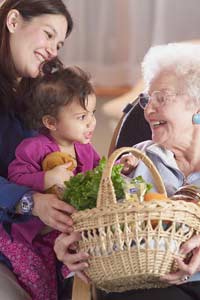Hospice volunteers provide support to patients and their families during the dying process.
SW Productions/Photodisc/Getty Images
Every year, millions of Americans die from illnesses such as heart disease, cancer, stroke and diabetes. And every year, roughly 400,000 hospice volunteers help many of these people through their last few months of life [source: Hospice Foundation of America].
A concept introduced in the U.S. in 1963 by a British doctor who founded the first modern hospice facility in a residential suburb of London, hospice is specialized care for patients with less than six months to live. The goal of hospice is to guide terminally ill patients through the final stage of their lives without hastening or postponing death [source: American Cancer Society].
The hospice team, including hospice volunteers, tries to keep patients as pain free and comfortable as possible while providing support for them and their families during the dying process.
The 24-hour care is typically provided in the patient’s home, but can also be administered at a hospital, nursing home or private hospice facility [source: American Cancer Society]. It is considered a return to older times when people died at home rather than in a hospital, before the modern age of medicine turned dying into a medical event.
Hospice volunteers provide all kinds of support for patients and their families, including visiting, reading, watching T.V., taking walks, playing music or bringing over pets. Volunteers also help with shopping, errands, household chores, babysitting and transportation. Or they can help facilitate bereavement support groups, get involved in fundraising or provide administrative support for the hospice by filing or sending out mailings [source: Hospice Foundation of America].
What a hospice volunteer does depends on his or her skills and interests. Read on to find out what kind of training it takes to become one.
Hospice Volunteer Training
When someone is dying, friends and family sometimes pull away, afraid of what is happening and at a loss for what to say. A hospice volunteer helps fill that gap by being a companion who understands the process of dying and provides compassion, comic relief and conversation.
Because death is such a sensitive issue, hospice volunteers go through extensive training that teaches them the history of hospice, the goals and philosophy of care, emergency procedures and what to expect during the stages of death [source: VistaCare].
The training, which is typically 20 to 30 hours spread out over several weeks, also helps volunteers develop the communication skills necessary to comfort and support patients and families, and explains the emotional and spiritual needs of patients at the end of life [source: Hospice Foundation of America].
There is no set standard for volunteer training and certification, and individual hospices typically provide the training themselves. If you have gone through hospice training before or are only interested in administrative work, you may be able to skip some of the training courses [source: Hospice Volunteer Association].
Hospice volunteers work an average of four hours each week and most hospices require a commitment of at least one year. Volunteers work with a clinical team of doctors, nurses and social workers. Because they tend to spend more time with the patients, hospice volunteers can often give the team valuable feedback about issues that arise in a case [source: Hospice Volunteer Association].
Read on to find out what hospice volunteering can do for you.
One More Reason to Volunteer
The federal government requires that 5 percent of the care a hospice patient receives be provided by volunteers in order for the hospice organization to receive Medicare and Medicaid reimbursement [source: Hospice Foundation of America].
Benefits of Becoming a Hospice Volunteer
Hospice volunteers say that being intimately involved with another person’s death gives them a greater appreciation for life. Some say it makes them more grateful and less susceptible to getting ruffled over life’s smaller hassles such as long lines and traffic jams [source: Hospice Volunteer Association].
Hospice volunteers report having a deep sense of satisfaction in being there for someone during a scary time of life. They feel like they are making a significant contribution to the community and providing a service they hope others would offer them, were they in need.
Some hospice volunteers say it helps them come to terms with their own mortality and promotes emotional and spiritual growth [source: VistaCare]. Others appreciate the closeness they develop with the family members and the opportunity to witness what is typically a very private moment. Providing hospice care can also help the volunteers learn how to deal with similar situations occurring in their own lives when a beloved family member or friend is facing death.
Like those who volunteer for other causes, hospice volunteers say they feel like they’re making a difference and doing so is very fulfilling, giving added purpose to their lives. Moreover, helping people through the dying process keeps the volunteers focused on what’s really important in their own lives [source: Hospice Volunteer Association].
Some become volunteers after watching their spouses, siblings or close friends die and want to honor them by providing this service. But no matter the reason that draws volunteers to hospice work, they all say it helps keep life in perspective.
For more information on hospice and volunteering, see the links on the next page.
How We Want to Die
Nine out of 10 Americans would prefer to die at home if they were terminally ill and had less than six months to live, according to two Gallop polls taken in 1992 and 1996 [source: Field].

